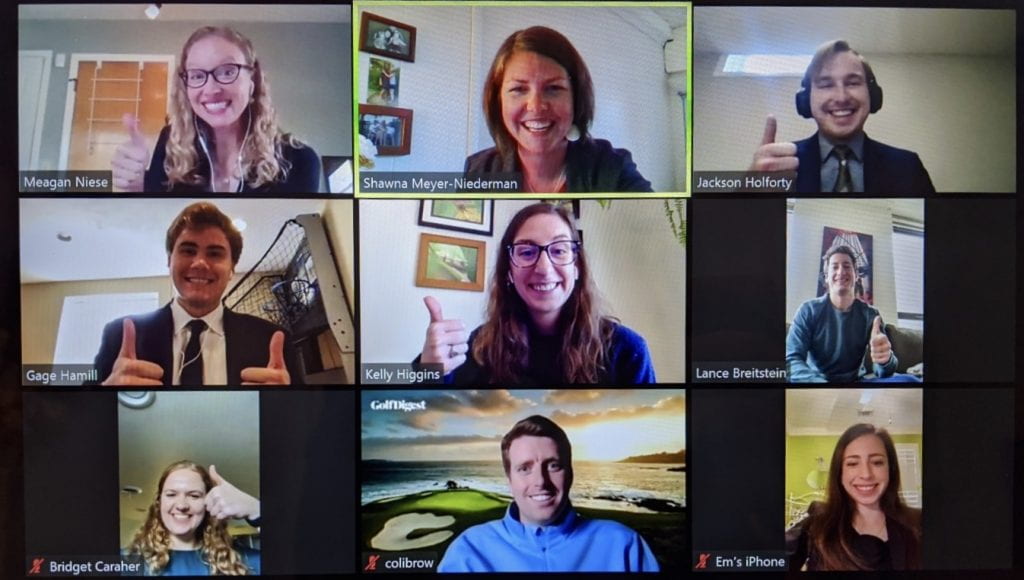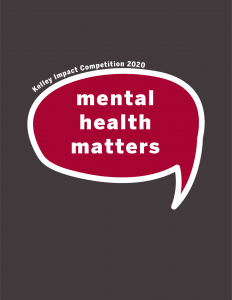
BLOOMINGTON, Ind. – Stay-at-home orders and other precautions against the coronavirus couldn’t stop organizers of the Kelley Impact Competition from moving forward to help the nation’s largest grassroots mental health organization.
This is the 10th anniversary of the Kelley Institute for Social Impact, which organized the case competition for socially-minded undergraduate students. It’s also the second year for the event, which last year aided Habitat for Humanity of Monroe County.
The top three teams receive monetary prizes, but more importantly, the winning team also receives $10,000 in seed money to support their idea and hopefully create lasting change for the client, which this year was the greater Bloomington chapter of the National Alliance on Mental Illness.
Teams were asked to identify strategies that will increase the impact that the local NAMI chapter will have on the community and come up with methods to expand the reach of its message and grow its base of supporters and volunteers.
Last fall, Kelley 2011 alumnus Lance Breitstein, whose gift made the competition possible, asked the focus to be on mental health and wellness.
As part of its “Decade of Difference” celebration, the competition – which is open to all undergraduates at IU Bloomington — originally was scheduled to cap off a week of activities. As it became apparent in March that the coronavirus was going to affect campus activities, organizers moved it to April 24 and online.
Ten of the 12 original teams – each consisting of four students – remained committed. During the competition, they used Zoom to log in from all over the world — from India and China – as well as from all across the country – from Florida, California, Ohio, Illinois, Texas, New York – and, of course, Indiana. Also tuning in were 13 judges who included alumni and community partners.
 Members of the winning team — pictured above with several judges — were Bridget Caraher, a senior from Munster, Indiana, and juniors Jackson Holforty, from Carmel, Indiana; Emily Klein, from Austin, Texas; and Gage Hamill, from Springfield, Illinois. In addition to receiving seed money for their project, they will share a $10,000 prize.
Members of the winning team — pictured above with several judges — were Bridget Caraher, a senior from Munster, Indiana, and juniors Jackson Holforty, from Carmel, Indiana; Emily Klein, from Austin, Texas; and Gage Hamill, from Springfield, Illinois. In addition to receiving seed money for their project, they will share a $10,000 prize.
The second-place team received $3,000 and third-place team received $2,000.
“I decided to compete in this case competition because I have several close friends who have been impacted by and struggled with mental health, and I believe in NAMI’s mission to grow awareness and end the stigma surrounding mental health,” said Hamill, who is majoring in finance and business analytics.
“I immediately wanted to participate because of how important mental health is in our community,” added Klein, who is majoring in information systems, business analytics and operations management.
The winning proposal suggested the creation of a new service learning course at IU Bloomington that combines event planning, fundraising and continued engagement with NAMI for multiple semesters. Because the budget for the winning proposal only required half of the seed money that is being awarded, the second-place proposal – featuring a combination of website updates, digital marketing, community events and video production – also will be partially funded.
Research indicates that about six percent of Indiana residents — more than 380,000 Hoosiers — is living with a serious mental illness like schizophrenia, bipolar disorder, major depression, or post- traumatic stress disorder. These brain disorders can be debilitating and substantially affect the lives of individuals, families and our communities.
Mental health is a significant health need in Monroe County, ranking fourth behind substance use/abuse, obesity, and poverty. More than 8 percent of residents in a survey said they had fair to poor mental health. Monroe County’s mortality rate for suicide is 20.5 percent, compared to 15.4 percent for the state.
Even during the best of times, awareness, support and education for those affected by mental illness and their support networks is greatly needed. When students first received their case for NAMI in early February, no one could foresee the feelings of isolation affecting those ones because of social distancing requirements due to COVID-19.
While the case given students wasn’t changed due to the virus, Shawna Meyer-Niederman, KISI’s associate director (pictured left), suspects that recent events led many to somewhat reassess their approaches and consider changing circumstances.
“It’s interesting that now, more than ever, we’re seeing how important that is,” she said. “With all of the things that are changing, it’s a little more common to talk about it and how important it is, as you’re realizing as we’re quarantining and away from our friends.”
Breitstein continues to see real value in the competition he founded. “The Kelley Impact Competition incentivizes the smartest students in the country to learn more about the issues in their community, find solutions, and make a real difference in the world around them,” he said.